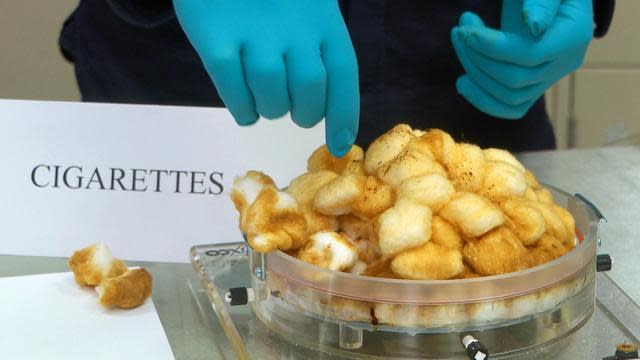E-cig panic ruining "biggest public health opportunity" in century, scientist says

This article, E-cig panic ruining "biggest public health opportunity" in century, scientist says, originally appeared on CBSNews.com
Researchers are working hard to determine the cause of affecting . Eight of those people have died, sparking a criminal investigation from the FDA – but even before this outbreak, . The American Lung Association has said that "e-cigarettes are not safe," but the American Cancer Society said they're "likely to be significantly less harmful for adults than smoking regular cigarettes."
One of the web's most talked-about pro-vaping videos is an experiment comparing the effects of tobacco cigarettes and e-cigarettes on the lungs, put out by England's top public health agency.
"My research shows that e-cigarettes are significantly less harmful than cigarettes," said Dr. Lion Shahab, an associate professor at University College London. Public Health England describes e-cigarettes as "at least 95% less harmful" than tobacco cigarettes.
Dr. David Abrams, a professor at New York University, said that he thinks that's a fair estimate. "Actually, I would go further," he said. "I think there's no evidence from looking at the cancer biomarkers, that it could be as high as 98% or 99% for cancer."
Abrams said he's worried that the panic over e-cigarette-linked illnesses will distract from the public health benefits they could offer.
"I think we've forgotten that 120 years ago, the disruptive technology was the cigarette rolling machine that literally caused this epidemic of lung cancer and other diseases. And now we have an opportunity 120 years later to get rid of the cigarette with a new technology that delivers nicotine in a very satisfying way without the major harms of burning tobacco," he said. "If we lose this opportunity, I think we will have blown the single biggest public health opportunity we've ever had in 120 years to get rid of cigarettes and replace them with a much safer form of nicotine for everybody." To parse the competing claims, "CBS This Morning" asked Abrams' colleagues in the school of medicine to recreate the experiment by Public Health England.
"This is gonna look very yucky," NYU School of Medicine professor Terry Gordon told "CBS This Morning" co-host Tony Dokoupil. "You're gonna see lots of brown and dark color, and that's what's gonna simulate what goes in the lungs of people."
For about two hours, the NYU team simulated smoking four packs of cigarettes, and compared it to the same amount of vaping. The differences were plain to see: The damage caused by cigarette smoke was obvious; the vapor from a coffee-flavored e-liquid, not so much.
"We will not allow our children to be used as human guinea pigs," added Meredith Berkman, co-founder of Parents Against Vaping E-Cigarettes.
Like the Trump administration, they say flavors marketed to teenagers is part of the problem. Data from 2018 shows that more than 20% of high school students used e-cigarettes, up 78% from 2017. Almost 70% of those students used flavored e-cigarettes.
Juul has said in the past that it has never marketed the product to youths. The vaping industry is reportedly already lobbying to create an exemption for mint and menthol, two of the most popular flavors used by teenagers, in . The congressional caucus will have its first major hearing on the issue next week.
Advocates sound the alarm on vaping dangers on Capitol Hill

